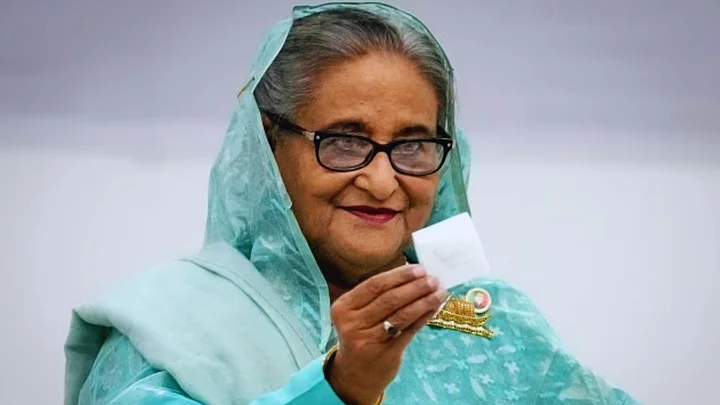As the results of the 12th general election emerged overnight after an eight-hour ballot exercise in over 42,000 voting centres across Bangladesh, the country’s four-time prime minister, Sheikh Hasina, must have been casually waiting to take up the same job for the next five years.
The election results, for a 119 million voters in a country of 170 million, were seen as a fait accompli.
With the country’s main opposition party — Begum Khaleda Zia's Bangladesh Nationalist Party (BNP) — choosing not to participate in what it dubbed a 'dummy election', everyone knew that the result was a foregone conclusion.
And that is what happened. The ruling Awami League (AL) emerged victorious.
Record Number of 'Independent' Candidates Won
Official results and gazettes are unlikely to come out until later in the day on Monday, but the unofficial results released by the Election Commission show that the AL bagged 223 out of 299 seats in the Jatiya Sangsad (Bangladesh's parliament). Voting for one of the seats was withheld due to the death of a candidate.
The Jatiya Party of late autocrat General H M Ershad, known for its dubious double role of being a coalition partner of the AL and also a pet opposition, appears to be the biggest loser of the contest, with its seats reduced to less than half, that is, only 11 seats.
Though the AL gave a 'walkover' to the Jatiya Party by not fielding its own candidates in as many as 26 constituencies, the other AL leaders who chose to contest as independent candidates gave the Jatiya Party nominees a hard time.
If there is anything to chew on in an otherwise dull, non-inclusive Jatiya Sangsad election, a record number of independent candidates won as many as 61 seats. And 58 of them are actually leaders of the ruling party who were encouraged by party chief Sheikh Hasina to contest at the cost of the AL's official candidates in those seats, just to help make this election look competitive and draw voters, who were otherwise disinterested to cast votes due to a lack of options to chose from.
The AL's efforts to pit their own as independent candidates against official party nominees paid off in terms of voter turnout. What many feared would be a very low number, the election eventually managed to have least 40 per cent (according to official numbers) of voters coming out.
But the several 'King's parties' that fielded hundreds of candidates in 300 constituencies, understandably with the blessings of the party in power, did not manage to secure a single seat.
A New Lease of Life for the Awami League
Given that 60 per cent of eligible voters did not cast their votes on Sunday, the BNP claims that it succeeded in its call to the people to boycott. The BNP and its allies wouldn’t accept the new government and vowed to continue the movement for holding a fresh election under a neutral, non-partisan, caretaker government.
Of the 12 national elections that Bangladesh had had since 1973, four were held under a non-partisan caretaker administration, that is, in 1991, 1996, 2001 and 2008; and those were arguably the best ones in terms of electoral neutrality and fairness.
After the questionable elections held under the AL government in 2014 and 2018, with lots of allegations around rigging, the BNP and its allies made fervent calls and staged protracted street agitations seeking a caretaker government to administer the 2024 elections but the AL didn’t budge .
Though there isn’t much question over the fairness of yesterday's election, it will go a long way in the country’s history of noninclusive, non-participatory elections. The new lease of life that the AL gained out of this election will inevitably lead to more rifts in Bangladesh's perennial political divide.
For now, Sheikh Hasina, the world's longest-serving female head of state, is all set to take oath as prime minister of a country she has already ruled for a good 20 years.
(Reaz Ahmad is the Executive Editor of the Dhaka Tribune. This is an opinion piece and the views expressed are the author’s own. The Quint neither endorses nor is responsible for them.)
